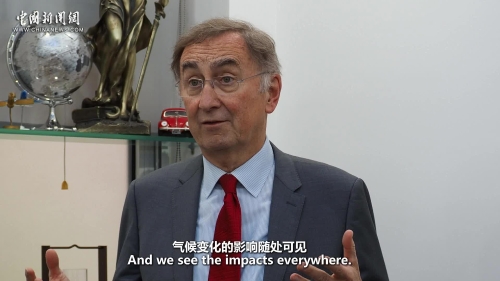Insights | Janos Pasztor: Ambitious global actions needed to address climate crisis
(ECNS) -- The 29th session of the Conference of the Parties to the United Nations Framework Convention on Climate Change (UNFCCC), or COP29, is underway since Monday in Azerbaijan's capital city of Baku. Janos Pasztor, former UN Assistant Secretary-General on Climate Change, has called for more ambitious goals to address the climate crisis.
Pasztor noted that today’s geopolitical tensions and intense competition for financial resources are adding new challenges to global climate efforts as well. To build a sustainable future, he stressed that countries must make the most of available resources through collective action.
While Pasztor believes the world has the resources necessary to combat climate change, he emphasized that more ambitious targets and joint action are essential to make real progress.
On climate finance, Pasztor highlighted that achieving climate goals hinges on countries’ willingness to better leverage existing resources. “Whether from public or private sectors, resources need to be transferred from the Global North to the Global South so that the latter can not only reduce emissions and increase adaptation efforts, but also foster low- and zero-carbon economic development for their future,” he said.
Despite global efforts, Pasztor observed that the world is not yet on track to meet its climate goals. He pointed to the observable, increasingly significant, and often catastrophic impacts of climate change as global warming continues, noting that current measures are still insufficient.
To cope with climate change effectively, he suggested accelerating the reduction of carbon emissions, and adapting to the changing environment to the largest possible extent. Corrective measures, however, are also needed, in particular to remove excess atmospheric carbon dioxide. As temporary, emergency measure, the direct cooling of the planet via solar radiation modification may also need to be considered while the world decarbonizes.
Key areas of collaboration include the agriculture, food, transport and industry systems. Pasztor explained that extreme weather driven by climate change directly or indirectly impacts agricultural production and food security, making agriculture a critical sector for climate adaptation.
Climate change remains one of the most significant challenges to sustainable global development. China, a key player in global climate initiatives, has been actively engaged in the United Nations Framework Convention on Climate Change (UNFCCC) process, contributing to the implementation of the Paris Agreement and promoting a green, low-carbon transformation, he said.
This year’s COP29 focuses on key issues including climate finance, technological innovation, Nationally Determined Contributions (NDCs), and Global Goal on Adaptation (GGA). It aims to advance international cooperation in the fight against climate change and promote green and sustainable development.

